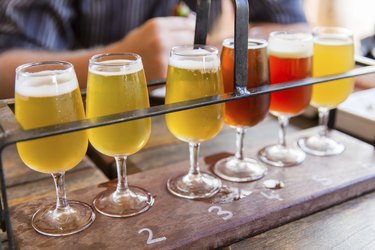
Silicon, a naturally occurring element, is pervasive in the environment and the second-most common element in the Earth's outer crust. This element is beneficial for a variety of health functions. Most silicon exists in a form that is unabsorbable. However, some foods contain significant quantities of silicon dioxide, a usable form of the element.
Plants
Video of the Day
Though silicon has not been determined to be an essential nutrient and there is no recommended allowance, the European Food Safety authority recommends a safe daily limit of 700 mg. The average adult consumes between 20 and 50 mg of silicon per day. In general, plants contain silicon, while the mineral is absent from animal foods. Depending on where you live, your drinking water may constitute a natural source of silicon in your diet. Beer also provides ample quantities of silicon, possibly derived from the grains it is made from.
Video of the Day
Variety
Silicon dioxide helps minimize damaging effects of aluminum and prevents Alzheimer's disease, according to nutritionist Phyllis Balch, author of the book "Prescription for Nutritional Healing." Silicon dioxide also contributes to healthy bone formation and slows aging. Your levels of silicon decrease with age, causing your dietary needs for silicon to increase. To ensure sufficient levels, choose a variety of healthy foods that are good sources for silicon dioxide, including alfalfa, beets, brown rice and oats. Bell peppers, soy beans and leafy green vegetables also provide ample amounts of this nutrient. Other food sources for silicon dioxide include asparagus, Jerusalem artichokes, parsley, sunflower seeds and grain husks, such as from barley, oats, millet and wheat.
Beverages
Beverages, such as beer, coffee and water are the main dietary sources of silicon dioxide for the average person, providing about 55 percent of daily intake, according to the U.S. Food and Drug Administration. Grains provide 14 percent and vegetables contribute about 8 percent to the average person's silicon consumption level, according to Dr. Dirk Vanded Berghe, in an interview with Richard Passwater, Ph.D., published in the December 2004 issue of "Whole Foods Magazine." Silicon benefits health by holding your tissues together and preventing aging of your skin and joints; however, modern foods are deficient in silicon dioxide due to soil depletion, says Vanden Berghe.
Horsetail and Algae
The herb horsetail provides a rich natural source of silicon dioxide that traditional herbalists use and recommend for healthy skin, nails and hair. Some forms of algae also contain considerable levels of absorbable silica and are used in the preparation of silicon supplements, according to naturopath Linda Rector-Page, author of the book "Linda Page's Healthy Healing: a Guide to Self-Healing for Everyone."
- "Prescription for Nutritional Healing"; Phyllis A. Balch; 2006
- "The European Food Safety Journal"; Calcium Silicate and Silicon Dioxide/Silicic Acid Gel Added for Nutritional Purposes to Food Supplement; F. Aguilar, et al; 2009
- DrPasswater.com; Exciting New Studies Verify Health Benefits of Silicon; December 2004
- "Linda Page's Healthy Healing: A Guide to Self-Healing for Everyone"; Linda G. Rector-Page; 2000